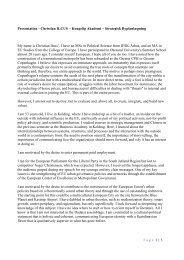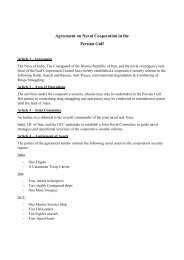diplomacy in antiquity
This is a review piece of books on diplomacy in antiquity begiining with mesopotamia, amarna, the phoenicians, the greeks and romans. The amarna book I found at an exposition at Glyptoteket, CPH.
This is a review piece of books on diplomacy in antiquity begiining with mesopotamia, amarna, the phoenicians, the greeks and romans. The amarna book I found at an exposition at Glyptoteket, CPH.
You also want an ePaper? Increase the reach of your titles
YUMPU automatically turns print PDFs into web optimized ePapers that Google loves.
Hatti were troubled, as the two states vied for control of the former territory Mittani, with Hatti
reluctant to admit Assyria into the Great Powers’ club.” The liberation of Assyria under Ashuruballit
in the 14 th century from Mittani led to a tense rapprochement between Babylonia and
Assyria, following a brief interlude of flirtations between the Hittites and Babylonia. Control of
resources and the supply lines lay at the heart of these conflicts. When the empire of Mittani
collapsed, Babylonia started meddling in Assyrian affairs to keep it from expanding while the
Hittites asserted their independence. To Babylonia's dismay, this spelled trouble for the Amarna-led
international system as it initially titled Assyria into Egypt’s orbit. It ultimately resulted in a much
closer relationship between Babylonia and Assyria following the war. Moreover, the relationship
with the unruly vassals, primarily on the Syro-Palestinean plain, took more and more time for the
Egyptian ruler’s time. The relationship between the Greater Kings and lesser kings dominated by
Egypt differed. The vassals primarily served as agents of the Empire. The motives underlying the
behavior of members in the Amarna-centered international society, Cohen (2000:53) accepts, were
more often than not informed by the desire for (1) physical security and differentiation from other
states (2) ontological security or predictability in relationships with the world, implying a desire for
stable social identities (3) recognition by other actors, over and above survival through brute force
(4) development, in the sense of realizing human aspirations for a better life, for which states were
repositories at the collective level’. Thus life on the savannah was eased by shared ideas, mutual
perceptions, and joint expectations that helped maintain the system into a system based on the
mutual adjustment and diplomatic interaction based on gifts, marriage, and a continuous
engagement between equals-in-power. “Distance, we may add, was intelligible in terms of traveling
time, not spatial extension.” During its later reign, Egypt developed an ideology that excluded the
notion of brotherhood among members of the system, instead emphasizing its hegemonic ideology,
sanctioned by the Gods and based on a system of center-periphery, apposite to Amarna’s sense of
4








